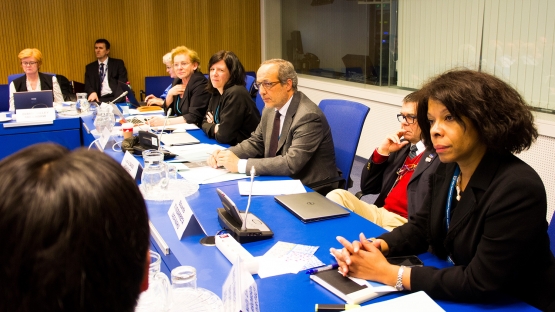Thirty international experts representing a broad range of institutions including the World Health Organization, regional professional societies of radiation oncologists and medical physicists, international financial institutions, members of the UICC’s Global Taskforce on Radiotherapy for Cancer Control, and radiotherapy equipment manufacturers, met in Vienna on 25-26 January 2017 to investigate innovative solutions to the challenges that cancer patients face in accessing radiotherapy services in low and middle income countries (LMICs).
Building on the outcomes of previous collaboration through the Advisory Group on increasing access to Radiotherapy Technology in LMICs (AGaRT) between 2009 and 2014, experts focused on priority areas to be addressed by working groups in identifying innovative solutions to deliver radiotherapy services that are affordable, sustainable and suitable for low-resource settings, financing and resource mobilization, strategic workforce development, strategic planning for radiotherapy technology and communication knowledge management and advocacy for radiotherapy.
“There is a huge need to generate sufficient funding to expand access to radiotherapy,” said Yolande Lievens, Chair of the Radiation Oncology Department of the University Hospital in Ghent, Belgium. “The working group on health financing is very important to create the framework to help replicate the financing models to the regionally appropriate contexts.”
The global burden of cancer is increasing rapidly. According to the International Agency for Research on Cancer, by 2030, 21.6 million will develop cancer each year rising from 14.1 million in 2012. This represents a major global health and development challenge with the greatest impact felt in developing countries, which are least equipped to deal with the socio-economic consequences of the disease.
In connection with improving the skills of medical professionals, Professor Zhongxing Liao, Medical Director for the Department of Radiation Oncology at the MD Anderson Cancer Center, University of Texas, remarked how radiation medicine is strengthened in the poorest countries when the health workforce is trained across all cancer services. “Governments and the private sector should be encouraged to support training programmes with resources, both financial and expertise, to ensure health professionals have local opportunities for professional development,” she said. “The IAEA’s Virtual University for Cancer Control, an excellent example of capacity building through customized e-learning, allows health professionals an opportunity to gain relevant skills in cancer care to serve patients effectively,” Professor Liao added.






